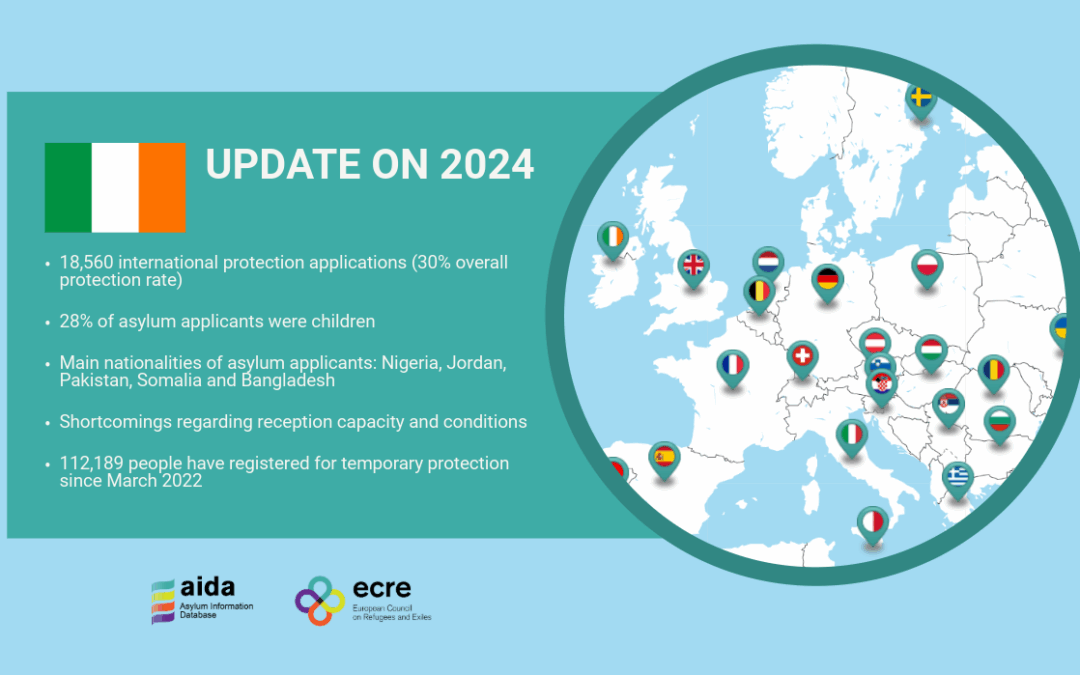|Published on: 9th June 2025|Categories: News|

The updated AIDA Country Report on Ireland provides a detailed overview on legislative and practice-related developments in asylum procedures, reception conditions, detention of asylum applicants and content of international protection in 2024. It is accompanied by an annex which provides an overview of temporary protection.
A number of key developments drawn from the overview of the main changes that have taken place since the publication of the update on 2023 are set out below.
Asylum procedure
- Statistics: In 2024, Ireland received 18,560 applications for international protection. The International Protection Office issued a total of 13,099 decisions of which 3,888 were positive (30% overall protection rate). 28% of the applicants were children under 18 and there was a significant increase in the number of unaccompanied minors arriving in the country. The main countries of origin of asylum applicants were Nigeria, Jordan, Pakistan, Somalia and Bangladesh.
- Access to the territory: In 2024, Ireland implemented stronger border controls – resulting in increased arrests and charges for failure to produce valid travel documents – and intensified checks at the Northern Ireland border. Civil society organisations raised concerns about potential refusals of entry to the international protection process.
- Use of safe country concepts: Throughout 2024, Ireland expanded and applied the accelerated international protection procedure for applicants from designated “safe countries of origin”, prioritising those from Nigeria and Jordan. The list of safe countries was updated in 2024 to include Algeria, Botswana, Brazil, Egypt, India, Malawi and Morocco. Meanwhile, the UK’s designation as a “safe country” was challenged in a High Court ruling which found Ireland’s legislation to be insufficiently aligned with EU law, as it did not require an assessment of the potential risk of serious harm to people if they were returned to a safe third country. This led to legislative amendments in mid-2024 in order to address the gap in existing legislation and to enable the resumption of returns to the UK.
Reception conditions
- Reception conditions: In 2024, Ireland’s reception system for international protection applicants faced severe strain, with capacity shortages leading to prolonged street homelessness for single men. Reception conditions deteriorated further with increased reliance on overcrowded emergency centres and substandard tented facilities, prompting serious concerns about human dignity, basic needs and mental health. A landmark High Court ruling (currently under appeal) found the State to be in breach of its obligations under EU law for failing to provide an adequate standard of living. Monitoring of reception conditions was strengthened in 2024 as the Health Information and Quality Authority assumed responsibility for inspecting International Protection Accommodation Service centres under legally binding national standards. Inspection reports published in November 2024 revealed non-compliance in six out of the nine centres monitored in key areas, including safeguarding, accommodation standards, governance and responsiveness to residents’
Temporary protection
- Statistics: As of February 2025, 112,189 people had registered for temporary protection in Ireland since March 2022. A total of 25,208 beneficiaries were residing in state-provided accommodation and 36,532 were in hosted or pledged arrangements. At the same time, 23,803 people had accessed the labour market while 17,420 Ukrainian students were enrolled in schools (10,483 in primary and 6,937 in secondary). By March 2025, 56,082 people were in receipt of income support and 14,774 were receiving child benefit, while 87,639 medical cards had been issued.
- Accommodation support: The government has proposed a reduction in the Accommodation Recognition Payment from €800 to €600 per month (initially introduced at €400), but this had not taken effect as of April 2025. In addition, Helping Irish Hosts stepped back from the Pledge Programme Consortium in April 2025 and the Irish Red Cross assumed full responsibility for the management and matching of pledged accommodation.
- Change in travel requirements:, Ireland initially suspended the requirement for a biometric passport for people fleeing the conflict in Ukraine and accepted alternative documents to facilitate urgent travel. However, this temporary measure was lifted in June 2024 and Ukrainian nationals were once again required to present a valid biometric passport to enter the country, with the government citing the need for a shift from emergency to more sustainable response mechanisms.
The full report is available here and the annex on temporary protection is available here.
For more information about the AIDA database or to read other AIDA reports, please visit the AIDA website.

